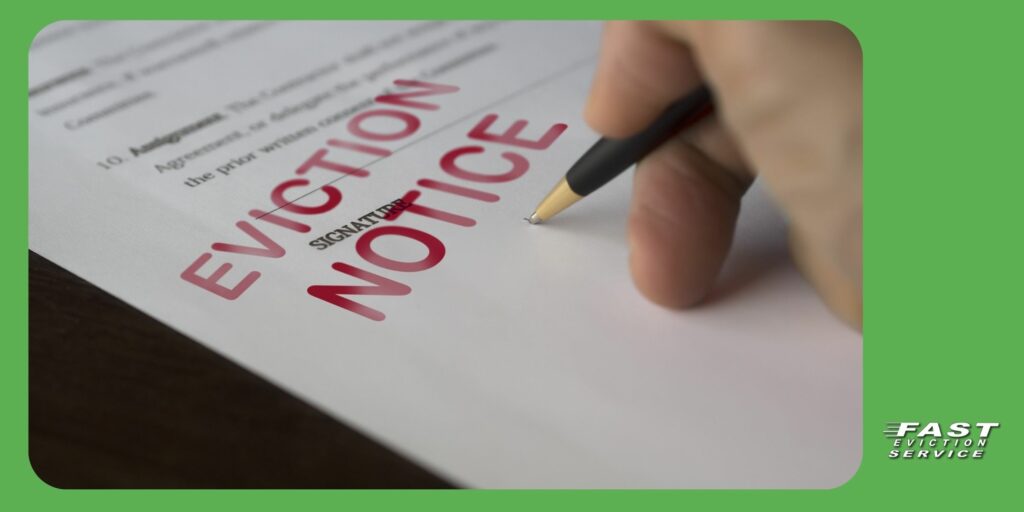Residential & Commercial Evictions | You are represented at all times by one of our California Eviction Attorneys | 1-800-686-8686 | intake@fastevict.com | Se habla español
The Section 8 Eviction Process Explained: A Landlord’s Guide
As a landlord, you may have chosen to work with the Section 8 program because of the guaranteed rent payments and access to a larger pool of tenants. However, even with these benefits, not every tenancy goes smoothly. When things go wrong, navigating the Section 8 eviction process can be more complex than a standard eviction. That’s because Section 8 tenants are protected by both local landlord-tenant laws and federal HUD regulations. Knowing the proper steps to take is critical not only to protect your investment but also to remain compliant with the law.

This guide walks you through every stage of the Section 8 eviction process, from identifying a legal reason to filing with the court. Whether you’re dealing with nonpayment of rent, serious lease violations, or criminal activity, this article gives you the confidence to move forward legally and effectively. If you’ve ever asked, “Can you evict a Section 8 tenant?” this guide is for you.
Too Long Didn’t Read (TL;DR):
The Section 8 eviction process requires landlords to follow both state eviction laws and HUD guidelines. You must first establish a legal reason for eviction, issue proper notice, and inform your local housing authority before going to court. While eviction is possible, it comes with extra steps that protect tenants receiving federal housing support. Staying compliant with HUD and state laws is essential for a successful outcome.
Table of Contents
- What Is the Section 8 Eviction Process?
- Can You Evict a Section 8 Tenant?
- Legal Grounds for Evicting Section 8 Tenants
- What Counts as Material Noncompliance?
- Drug and Criminal Activity: When Immediate Termination Applies
- Understanding Tenant Rights and Reasonable Accommodations
- How to Notify the Housing Authority (PHA)
- How the Court Process Works for Section 8 Evictions
- Tips for Landlords to Stay Compliant During Section 8 Evictions
- Common Mistakes to Avoid When Evicting a Section 8 Tenant
- Frequently Asked Questions
What Is the Section 8 Eviction Process?
The Section 8 eviction process involves multiple steps that ensure fair treatment for tenants receiving rental assistance through the Housing Choice Voucher Program. Unlike a standard tenant eviction, this process includes communication with the local Public Housing Authority (PHA) and compliance with HUD regulations.
Once a landlord identifies a valid reason for eviction, they must serve the tenant with a written notice and inform the PHA. If the tenant does not vacate the unit or resolve the issue, the landlord may file a lawsuit in court to regain possession of the property. Evictions must always be justified and handled professionally, or landlords risk penalties and potential legal action.
Can You Evict a Section 8 Tenant?
Yes, you can evict a Section 8 tenant. However, you must follow specific procedures that respect both state laws and federal housing regulations. Many landlords ask this question when facing ongoing issues with tenants receiving subsidies.
Before moving forward, you must have a legal reason. This includes repeated late payments, severe lease violations, or criminal activity. It is not enough to be unhappy with the tenant’s behavior or frustrated by missed rent. HUD requires that evictions be supported by documentation and consistent enforcement of lease terms.
Legal Grounds for Evicting Section 8 Tenants
HUD outlines several acceptable reasons to terminate a Section 8 tenancy. These include material noncompliance with the lease, nonpayment of rent, drug-related or criminal activity, and violations of state or local landlord-tenant laws.
The eviction process under Section 8 also allows for termination when the tenant fails to provide accurate information about their income, household composition, or other eligibility criteria. While these grounds may seem straightforward, they must be carefully documented and clearly communicated to both the tenant and the PHA.
What Counts as Material Noncompliance?
Material noncompliance refers to serious lease violations that go beyond minor issues. These include willfully providing false information, damaging the unit, or violating occupancy limits. Repeated smaller violations, such as noise complaints or unauthorized pets, can also qualify if they interfere with the peaceful enjoyment of others or create property management problems.
To use material noncompliance as a reason for eviction, you need clear documentation. This includes lease agreements, incident reports, repair invoices, and witness statements. Make sure the tenant is given notice of the violation and an opportunity to respond.
Drug and Criminal Activity: When Immediate Termination Applies
Drug-related or criminal activity is among the most serious grounds for Section 8 eviction. Landlords can take immediate action if a tenant engages in behavior that threatens the health, safety, or peace of others. Examples include drug use, drug distribution, violent offenses, or serious property damage.
Even if the criminal activity is committed by a guest or another household member, the tenant may still be held responsible. HUD emphasizes that public housing must remain safe, and landlords are encouraged to act swiftly but fairly. However, evidence must be solid, and termination notices must detail the offenses.
Understanding Tenant Rights and Reasonable Accommodations
Section 8 tenants have legal protections that include the right to due process and, when applicable, reasonable accommodations under the Fair Housing Act. For example, a tenant with a mental disability who causes disruption may be entitled to a modified lease agreement rather than immediate eviction.
Any notices you issue must include information about the tenant’s right to request accommodations. This could mean rescheduling meetings, providing notices in accessible formats, or allowing more time to remedy a lease violation. Ignoring these protections can lead to legal challenges and delays.
How to Notify the Housing Authority (PHA)
Before you can proceed with a court filing, you must notify the PHA of your intention to terminate the tenancy. This is typically done through a written notice submitted to your assigned caseworker.
The PHA may request supporting documentation and will conduct its own review to ensure your actions are consistent with the Housing Assistance Payments (HAP) contract. Failing to notify the PHA can jeopardize your case and delay eviction.
How the Court Process Works for Section 8 Evictions
Once all notice periods have expired, and the PHA has been notified, you can proceed to file an eviction case in your local court. This process may be referred to as “Unlawful Detainer” or “Summary Possession” depending on your jurisdiction.
At the court hearing, you’ll need to present evidence of the tenant’s lease violation and show that you followed all required steps, including proper notification and adherence to HUD policies. If the judge rules in your favor, a sheriff or constable will carry out the eviction. Tenants who lose their voucher due to eviction may not be able to secure housing assistance again.
Tips for Landlords to Stay Compliant During Section 8 Evictions
One of the most important things landlords can do is remain consistent and professional throughout the eviction process. Always document communication with tenants, maintain updated records, and avoid making decisions based on frustration.
It’s also essential to enforce lease terms equally with all tenants, not just those in the Section 8 program. This will protect you from claims of discrimination and ensure that your actions hold up in court. If you’re unsure about a particular case, seek legal advice or contact the housing authority for guidance.
Common Mistakes to Avoid When Evicting a Section 8 Tenant
Many landlords make the mistake of not understanding HUD rules before serving a Section 8 tenant with a notice to vacate. Another frequent error is failing to give tenants the opportunity to respond or make corrections before filing in court.
Additionally, landlords sometimes forget to inform the PHA or assume that local laws override federal housing requirements. Not only does this weaken your case, but it can also lead to fines or even legal consequences. Taking shortcuts or skipping steps almost always backfires.
Frequently Asked Questions About the Section 8 Eviction Process
Can I evict a Section 8 tenant for not paying rent?
Yes, if the tenant fails to pay their portion of the rent, you can begin the eviction process. However, you must follow all HUD and local guidelines.
What notice do I need to give a Section 8 tenant?
The notice must state the reason for termination, a deadline for vacating, and inform the tenant of their right to meet with you and request accommodations.
Do I have to contact the housing authority before filing in court?
Yes, landlords are required to notify the Public Housing Authority before taking legal action.
What happens if a Section 8 tenant is evicted?
The tenant may lose their voucher and become ineligible for future housing assistance, depending on the reason for the eviction.
Can a tenant fight a Section 8 eviction?
Yes. Tenants have the right to respond to notices, attend hearings, and present a defense in court.





